Liquid Dispensing Pump Market
Liquid Dispensing Pump Market Size and Share Forecast Outlook 2025 to 2035
Liquid dispensing pump market is projected to grow from USD 2.1 billion in 2025 to USD 3.1 billion by 2035, at a CAGR of 4.0%. Lotion/Soap Pumps will dominate with a 48.0% market share, while personal care will lead the end use segment with a 52.0% share.
Liquid Dispensing Pump Market Forecast and Outlook 2025 to 2035
The liquid dispensing pump industry stands at the threshold of a decade-long expansion trajectory that promises to reshape specialty packaging applications, personal care dispensing enhancement, and precise liquid delivery solutions across consumer goods, healthcare packaging, and specialty dispensing sectors. The market's journey from USD 2.1 billion in 2025 to USD 3.1 billion by 2035 represents substantial growth, the market will rise at a CAGR of 4.0% which demonstrating the accelerating adoption of precision dispensing systems and advanced liquid delivery solutions across personal care manufacturing, household products, and specialty packaging sectors.
Quick Stats for Liquid Dispensing Pump Market
- Liquid Dispensing Pump Market Value (2025): USD 2.1 billion
- Liquid Dispensing Pump Market Forecast Value (2035): USD 3.1 billion
- Liquid Dispensing Pump Market Forecast CAGR: 4.0%
- Leading Product in Liquid Dispensing Pump Market: Lotion/soap pumps
- Key Growth Regions in Liquid Dispensing Pump Market: North America, Europe, and Asia Pacific
- Top Key Players in Liquid Dispensing Pump Market: Silgan Dispensing, AptarGroup, Albea, Berry Global, RPC Promens
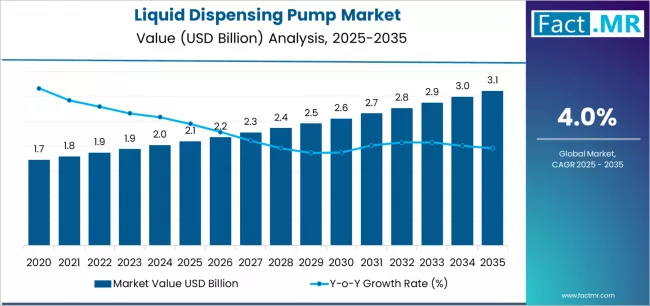
The first half of the decade (2025-2030) will witness the market climbing from USD 2.1 billion to approximately USD 2.5 billion, adding USD 0.4 billion in value, which constitutes 40% of the total forecast growth period. This phase will be characterized by the rapid adoption of lotion/soap pump systems, driven by increasing demand for hygienic dispensing solutions and the growing need for precise liquid delivery worldwide. Advanced dispensing capabilities and flexible packaging systems will become standard expectations rather than premium options.
The latter half (2030-2035) will witness continued growth from USD 2.5 billion to USD 3.1 billion, representing an addition of USD 0.6 billion or 60% of the decade's expansion. This period will be defined by mass market penetration of specialized liquid dispensing technologies, integration with comprehensive packaging platforms, and seamless compatibility with existing manufacturing infrastructure. The market trajectory signals fundamental shifts in how producers approach dispensing optimization and packaging quality management, with participants positioned to benefit from continued demand across multiple application types and distribution segments.
Liquid Dispensing Pump Market Year-over-Year Forecast (2025-2035)
The liquid dispensing pump market demonstrates distinct growth phases with varying market characteristics and competitive dynamics. Between 2025 and 2030, the market progresses through its dispensing solution adoption phase, expanding from USD 2.1 billion to USD 2.5 billion with steady annual increments averaging 4.0% growth. This period showcases the transition from conventional dispensing methods to advanced liquid pump-based systems with enhanced precision capabilities and integrated quality control systems becoming mainstream features.
The 2025-2030 phase adds USD 0.4 billion to market value, representing 40% of total decade expansion. Market maturation factors include standardization of personal care packaging and dispensing protocols, declining component costs for specialized pump equipment, and increasing industry awareness of precision dispensing benefits reaching 95-98% delivery effectiveness in personal care and household applications. Competitive landscape evolution during this period features established packaging companies like Silgan Dispensing and AptarGroup expanding their dispensing portfolios while specialty manufacturers focus on advanced pump development and enhanced delivery capabilities.
From 2030 to 2035, market dynamics shift toward advanced dispensing integration and global packaging distribution expansion, with growth continuing from USD 2.5 billion to USD 3.1 billion, adding USD 0.6 billion or 60% of total expansion. This phase transition centers on specialized liquid dispensing systems, integration with automated packaging networks, and deployment across diverse personal care, household, and healthcare scenarios, becoming standard rather than specialized applications.
Liquid Dispensing Pump Market Key Takeaways
At-a-Glance Metrics
| Metric | Value |
|---|---|
| Market Value (2025) → | USD 2.1 billion |
| Market Forecast (2035) ↑ | USD 3.1 billion |
| Growth Rate ★ | 4.0% CAGR |
| Leading Product → | Lotion/Soap Pumps |
| Primary End Use → | Personal Care Segment |
The market demonstrates strong fundamentals with personal care applications capturing a dominant share through advanced dispensing and hygiene enhancement capabilities. Lotion/soap pumps drive primary performance, supported by increasing hygienic dispensing adoption and specialty packaging trends. Geographic expansion remains concentrated in developed markets with established personal care infrastructure, while emerging economies show accelerating adoption rates driven by hygiene consciousness and rising dispensing quality standards.
Why is the Liquid Dispensing Pump Market Growing?
Market expansion rests on three fundamental shifts driving adoption across the personal care, household products, and healthcare sectors. First, hygienic dispensing demand creates compelling operational advantages through liquid pumps that provide immediate contamination prevention benefits without contact requirements, enabling manufacturers to meet hygiene requirements while maintaining product quality and reducing contamination risks. Second, precision dispensing development accelerates as specialty packaging facilities worldwide seek advanced pump systems that complement traditional dispensing processes, enabling precise liquid delivery and quality control that align with industry standards and regulatory requirements.
Third, convenience enhancement drives adoption from consumer goods facilities and specialty manufacturers requiring effective dispensing systems that maximize user convenience while maintaining operational productivity during packaging and product integration operations. Growth faces headwinds from material cost fluctuations that vary across polymer suppliers regarding the sourcing of pump components and specialty manufacturing requirements, which may limit adoption in cost-sensitive environments. Technical limitations also persist regarding pump durability and chemical compatibility that may reduce effectiveness in complex formulation environments, which affect dispensing consistency and system reliability.
Opportunity Pathways - Liquid Dispensing Pump Market
The liquid dispensing pump market represents a precision packaging opportunity driven by expanding hygiene trends, consumer convenience modernization, and the need for superior dispensing effectiveness in diverse consumer applications. As manufacturers worldwide seek to achieve 95-98% dispensing effectiveness, reduce contamination risks, and integrate advanced pump systems with packaging platforms, liquid dispensing pumps are evolving from basic dispensers to sophisticated packaging solutions ensuring product quality and user convenience benefits.
The market's growth trajectory from USD 2.1 billion in 2025 to USD 3.1 billion by 2035 at a 4.0% CAGR reflects fundamental shifts in consumer preferences and packaging optimization. Geographic expansion opportunities are particularly pronounced in Asia Pacific markets, while the dominance of personal care applications (52.0% market share) and lotion/soap pump products (48.0% share) provides clear strategic focus areas.
- Pathway A - Lotion/Soap Pumps Leadership & Advanced Dispensing OptimizationStrengthening the dominant lotion/soap pumps segment (48.0% market share) through enhanced pump formulations, superior dispensing content, and automated packaging systems. This pathway focuses on optimizing dispensing precision, improving pump consistency, extending operational effectiveness to 95-98% success rates, and developing specialized formulations for diverse personal care applications. Market leadership consolidation through advanced dispensing engineering and integrated packaging systems enables premium positioning while defending competitive advantages against alternative dispensing systems. Expected revenue pool: USD 150-200 million
- Pathway B - Personal Care Application Expansion & Market LocalizationRapid personal care and consumer goods growth across global markets creates substantial expansion opportunities through specialized dispensing capabilities and brand partnerships. Growing hygiene consciousness and convenience trends drive continued demand for advanced liquid dispensing systems. Application strategies reduce packaging costs, enable superior dispensing performance, and position companies advantageously for consumer programs while accessing growing retail markets. Expected revenue pool: USD 160-215 million
- Pathway C - 28/410 Closure Dominance & Compatibility IntegrationExpansion within the dominant 28/410 closure segment (44.0% market share) through specialized compatibility management addressing standard packaging and operational requirements. This pathway encompasses universal fitting systems, compatibility optimization, and integration with diverse packaging platforms. Premium positioning reflects superior compatibility and comprehensive packaging compliance supporting modern consumer commerce. Expected revenue pool: USD 140-185 million
- Pathway D - Trigger/Spray Application DiversificationStrategic expansion into trigger/spray applications (34.0% market share) requires enhanced dispensing capabilities and specialized processing addressing spray operational requirements. This pathway addresses cleaning applications, household products, and integration with advanced processing for demanding spray conditions. Premium pricing reflects specialized performance requirements and spray delivery standards. Expected revenue pool: USD 105-140 million
- Pathway E - Household/Chemical Market InnovationDevelopment of specialized liquid dispensing applications for household/chemical sector (31.0% share), addressing specific dispensing requirements and chemical compatibility demands. This pathway encompasses chemical-resistant systems, household applications, and cost-effective alternatives for chemical markets. Technology differentiation through proprietary design enables diversified revenue streams while reducing dependency on single application platforms. Expected revenue pool: USD 95-130 million
- Pathway F - 24/410 Development & Manufacturing IntegrationExpansion of 24/410 segment (36.0% market share) through enhanced compatibility properties, standard applications, and specialized manufacturing requirements. This pathway encompasses standard fitting development, compatibility applications, and processed products requiring consistency characteristics. Market development through standardized manufacturing enables differentiated positioning while accessing markets requiring standard closure solutions. Expected revenue pool: USD 110-150 million
- Pathway G - Healthcare Development & Medical IntegrationDevelopment of healthcare applications addressing specialized medical requirements and pharmaceutical dispensing across diverse medical scenarios. This pathway encompasses medical-grade systems, pharmaceutical applications, and comprehensive regulatory documentation. Premium positioning reflects medical expertise and regulatory capabilities while enabling access to healthcare programs and medical-driven partnerships. Expected revenue pool: USD 50-70 million
Segmental Analysis
Primary Classification: The market segments by product into Lotion/soap pumps, Trigger/spray, and Fine mist/others categories, representing the evolution from traditional dispensing methods to specialized liquid delivery solutions for comprehensive packaging optimization.
Secondary Classification: End-use segmentation divides the market into Personal care, Household/chemical, and Healthcare sectors, reflecting distinct requirements for dispensing performance, hygiene standards, and application quality specifications.
Tertiary Classification: Closure segmentation covers 28/410, 24/410, and Specialty/others categories, with 28/410 closures leading adoption while specialty applications show accelerating growth patterns driven by customization expansion programs.
By Product, the Lotion/Soap Pumps Segment Accounts for Dominant Market Share
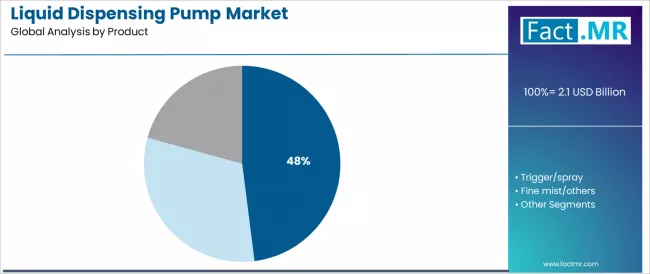
Market Position: Lotion/soap pump systems command the leading position in the Liquid Dispensing Pump market with approximately 48.0% market share through advanced dispensing features, including superior precision content, flexible delivery capability, and pump optimization that enable manufacturers to achieve optimal liquid dispensing benefits across diverse personal care and household environments.
Value Drivers: The segment benefits from manufacturer preference for reliable pump systems that provide consistent dispensing performance, reduced waste generation, and delivery efficiency optimization without requiring significant packaging modifications. Advanced dispensing features enable automated packaging systems, precision control, and integration with existing manufacturing equipment, where dispensing performance and system reliability represent critical operational requirements.
Competitive Advantages: Lotion/soap pump systems differentiate through proven dispensing stability, consistent delivery characteristics, and integration with automated packaging systems that enhance operational effectiveness while maintaining optimal quality suitable for diverse personal care and household applications.
Key market characteristics:
- Advanced dispensing formulations with optimized pump mechanisms and delivery capabilities
- Extended operational effectiveness, enabling 95-98% dispensing success with consistent liquid delivery quality
- Packaging compatibility, including automated filling systems, quality monitoring, and process integration for personal care and household operations
Trigger/Spray Systems Show Household Growth
Trigger/spray systems maintain a significant 34.0% market share in the Liquid Dispensing Pump market due to their specialized spray properties and versatile application advantages. These systems appeal to manufacturers requiring high-quality dispensing with consistent characteristics for cleaning applications, household products, and specialty spraying. Market growth is driven by household sector expansion, emphasizing reliable spray solutions and operational efficiency through optimized dispensing systems.
By End Use, the Personal Care Segment Accounts for the Largest Market Share
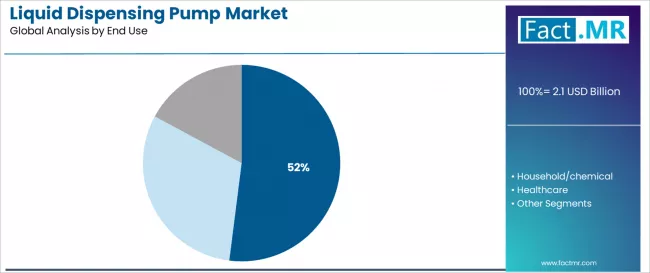
Market Context: Personal care applications dominate the Liquid Dispensing Pump market with approximately 52.0% market share due to widespread adoption of hygienic packaging platforms and increasing focus on contamination prevention systems, product safety, and user convenience applications that minimize traditional dispensing limitations while maintaining product quality standards.
Appeal Factors: Personal care manufacturers prioritize hygiene maintenance, contamination prevention, and integration with existing packaging infrastructure that enables coordinated production across multiple product categories. The segment benefits from substantial consumer safety investment and modernization programs that emphasize the acquisition of advanced dispensing systems for hygiene improvement and packaging efficiency applications.
Growth Drivers: Clean beauty trends incorporate liquid dispensing pumps as premium packaging for personal care operations, while hygiene trends increase demand for advanced dispensing capabilities that comply with safety standards and minimize contamination risks.
Market Challenges: Varying product viscosities and packaging requirements may limit system standardization across different manufacturing facilities or operational scenarios.
By Closure, 28/410 Closure Leads in Household and Chemical Applications
The 28/410 closure type captures approximately 50.0% of the market share in 2025. This size is particularly popular in household and chemical applications due to its compatibility with a wide range of cleaning products, chemicals, and personal care items. The robust design of 28/410 closures ensures effective dispensing and chemical resistance, making it a preferred choice for manufacturers in both the consumer and industrial sectors.
24/410 Closure Holds Strong in Consumer Packaging
The 24/410 closure type accounts for 35.0% of the market share, primarily used in consumer packaging for personal care products, cosmetics, and food and beverage. This closure offers a more compact and cost-effective option, maintaining high functionality in terms of dispensing while catering to a growing demand for smaller, portable packaging solutions.
Specialty/Others Closures Serve Niche Markets
The specialty/others closure category holds approximately 15.0% of the market share in 2025. This segment includes closures designed for specific applications, such as high-security or tamper-evident packaging, which are required for industries like pharmaceuticals, food safety, and industrial chemicals. The specialty closures are vital for ensuring regulatory compliance and consumer safety, often featuring custom designs to meet stringent industry standards.
What are the Drivers, Restraints, and Key Trends of the Liquid Dispensing Pump Market?
Growth Accelerators: Hygiene awareness trends drive primary adoption as liquid dispensing pumps provide advanced contamination prevention capabilities that enable personal care facilities to meet consumer hygiene demands without contact requirements, supporting safety operations and cleanliness missions that require hygienic dispensing applications. Consumer convenience consciousness accelerates market expansion as facilities seek effective dispensing systems that minimize waste while maintaining operational effectiveness during packaging and delivery scenarios. Packaging innovation spending increases worldwide, creating continued demand for liquid dispensing systems that complement traditional packaging processes and provide operational flexibility in complex consumer product environments.
Growth Inhibitors: Material cost fluctuations vary across polymer suppliers regarding the sourcing of pump components and specialty manufacturing requirements, which may limit operational flexibility and market penetration in regions with limited material capacity or cost-sensitive packaging operations. Pump durability limitations persist regarding performance consistency and chemical compatibility that may reduce effectiveness in complex formulation, aggressive chemicals, or extended storage conditions, affecting dispensing quality and system reliability. Market fragmentation across multiple closure specifications and end-use standards creates compatibility concerns between different suppliers and existing packaging infrastructure.
Market Evolution Patterns: Adoption accelerates in personal care and household sectors where hygiene requirements justify liquid dispensing system investments, with geographic concentration in developed markets transitioning toward mainstream adoption in emerging economies driven by hygiene consciousness expansion and consumer development. Technology development focuses on enhanced dispensing capabilities, improved pump durability, and integration with packaging systems that optimize liquid delivery effectiveness and operational performance.
Analysis of the Liquid Dispensing Pump Market by Key Country
The liquid dispensing pump market demonstrates varied regional dynamics with Growth Leaders including the United States (4.6% CAGR) and Mexico (4.3% CAGR) driving expansion through consumer goods capacity additions and packaging development programs. Steady Performers encompass Germany (3.9% CAGR), France (3.7% CAGR), and United Kingdom (3.4% CAGR), benefiting from established packaging industries and advanced dispensing adoption. Mature Markets feature South Korea (3.3% CAGR) and Japan (3.1% CAGR), where specialized applications and technology integration support consistent growth patterns.
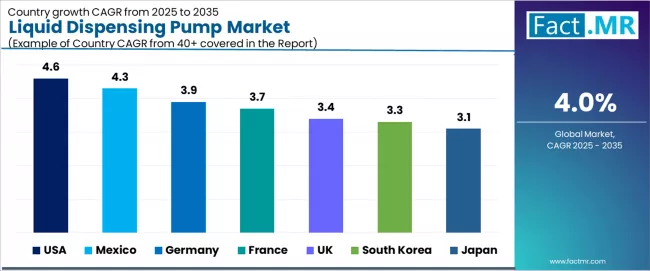
| Country | CAGR (2025-2035) |
|---|---|
| United States | 4.6% |
| Mexico | 4.3% |
| Germany | 3.9% |
| France | 3.7% |
| United Kingdom | 3.4% |
| South Korea | 3.3% |
| Japan | 3.1% |
United States Demonstrates Technology Innovation
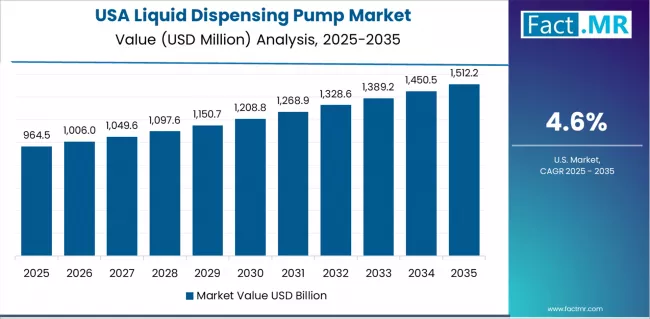
The U.S. market emphasizes advanced dispensing features, including precision delivery control and integration with comprehensive packaging platforms that manage production efficiency, cost optimization, and regulatory compliance applications through unified monitoring systems. The country demonstrates strong growth at 4.6% CAGR, driven by packaging modernization, consumer safety initiative projects, and emerging hygiene applications that support liquid dispensing system integration. American manufacturers prioritize operational effectiveness with liquid dispensing pumps delivering consistent performance through advanced dispensing algorithms and packaging adaptation capabilities.
Technology deployment channels include major consumer goods companies, specialized packaging suppliers, and retail procurement programs that support professional applications for complex packaging and consumer product applications. System integration capabilities with established packaging platforms expand market appeal across diverse operational requirements seeking dispensing efficiency and safety compliance benefits. The resilient consumer goods sector and expanding hygiene capacity additions create continued demand, while innovative applications in eco-friendly packaging open new growth avenues.
Performance Metrics:
- Consumer goods manufacturing facilities in Ohio, New Jersey, and California leading adoption for hygienic packaging operations
- Specialty packaging contractor channels maintaining 74% market share for complex consumer goods integration applications
- Commercial hygiene programs supporting 36% of system acquisitions across packaging and consumer facilities
- System compatibility with major packaging platforms driving procurement selection criteria
Mexico Emerges as High-Growth Market
Mexico leads growth momentum with a 4.3% CAGR, driven by rapid consumer goods industry modernization, expanding personal care applications, and specialty packaging development adoption across major manufacturing regions including Estado de México, Jalisco, and Nuevo León. Consumer goods industry development and packaging requirements drive primary demand, while growing household products and personal care sectors create diversified application opportunities. Government consumer goods industry initiatives and packaging programs support continued expansion. The convergence of consumer goods industry modernization, packaging processing growth, and manufacturing capacity expansion positions Mexico as a key emerging market for liquid dispensing systems.
Strategic Market Indicators:
- Government support for consumer goods industry development and packaging expansion driving demand for specialty liquid dispensing processing throughout major manufacturing regions and consumer goods clusters across packaging facilities, manufacturing centers, and consumer goods production centers
- Strong consumer goods sector growth and expanding network of packaging facilities supporting rapid adoption of liquid dispensing technologies among manufacturers seeking enhanced dispensing efficiency and premium packaging offerings
Germany Maintains Technology Leadership
Advanced packaging market in Germany demonstrates sophisticated liquid dispensing deployment with documented operational effectiveness in consumer goods applications and packaging facilities through integration with existing dispensing systems and production infrastructure. The country leverages engineering expertise in packaging technology and dispensing systems integration to maintain strong growth at 3.9% CAGR. Industrial centers, including North Rhine-Westphalia, Bavaria, and Baden-Württemberg, showcase premium installations where dispensing systems integrate with comprehensive packaging platforms and manufacturing management systems to optimize production and dispensing effectiveness.
German packaging companies prioritize system reliability and EU compliance in dispensing development, creating demand for premium dispensing systems with advanced features, including production monitoring integration and automated packaging systems. The market benefits from established packaging infrastructure and willingness to invest in advanced dispensing technologies that provide long-term operational benefits and compliance with international packaging safety and quality standards. Premium consumer applications, specialty dispensing systems, and packaging programs drive diversified demand across multiple end-use segments.
Market Intelligence Brief:
- Engineering focuses on EU standardization and packaging compliance, driving premium segment growth
- Packaging partnerships providing 43% faster development cycles
- Technology collaboration between German packaging companies and international dispensing suppliers
- Manufacturing training programs expanding liquid dispensing system integration in packaging and consumer goods scenarios
France Shows Balanced Packaging Growth
France maintains steady expansion at 3.7% CAGR through diversified demand from packaging programs, specialty consumer goods modernization activities, and dispensing development projects. Major packaging regions in Île-de-France, Rhône-Alpes, and Provence-Alpes-Côte d'Azur drive liquid dispensing adoption for commercial and luxury consumer goods production. Packaging research and development programs create continued dispensing demand, while premium personal care applications provide additional growth opportunities. Government support for packaging innovation and consumer goods quality initiatives supports consistent market development.
Market Characteristics:
- Advanced packaging research capabilities and specialty consumer goods regulations creating demand for innovative dispensing technologies supporting packaging development and consumer goods optimization
- Strong luxury goods tradition and packaging excellence leadership driving adoption of premium dispensing technologies and packaging systems throughout consumer goods facilities
United Kingdom Drives Packaging Processing and Dispensing Integration
The U.K. market holds steady growth at 3.4% CAGR, driven by packaging processing modernization activities, specialty consumer goods programs, and advanced dispensing adoption trends. British packaging facilities and consumer goods companies are implementing advanced liquid dispensing systems to enhance production capabilities and support manufacturing operations that align with packaging regulations and quality standards. Market expansion benefits from government packaging quality programs that mandate advanced dispensing capabilities in specialty packaging and consumer goods specifications, creating continued demand where operational flexibility and system compliance represent critical requirements.
Strategic Market Indicators:
- Packaging processing and consumer goods facilities leading adoption with modernization programs requiring advanced dispensing systems
- Government packaging quality programs providing regulatory support for advanced dispensing system acquisition
- Specialty packaging compliance requirements driving demand for standardized systems with international operational compatibility
- Specialized consumer goods and premium packaging segments adopting comprehensive dispensing solutions for packaging optimization
South Korea Emphasizes Advanced Processing Integration
South Korea demonstrates robust market development with a 3.3% CAGR, distinguished by packaging companies and specialty consumer goods producers' preference for high-quality liquid dispensing systems that integrate seamlessly with existing production systems and provide reliable long-term operation in specialized dispensing applications. The market prioritizes advanced features, including precision dispensing control, system durability, and integration with comprehensive packaging platforms that reflect Korean industry expectations for technological sophistication and operational excellence.
Growth drivers encompass K-beauty applications, expanding packaging modernization requirements, and dispensing system integration. Korean manufacturers emphasize quality control systems and comprehensive technical support that align with domestic packaging industry standards. The convergence of high-tech packaging, specialty consumer goods innovation, and growing dispensing production creates diversified demand across multiple application segments.
Market Characteristics:
- Premium focus on personal care systems with advanced dispensing algorithms and precision delivery capabilities
- Integration requirements with existing packaging processing and specialty consumer goods platforms
- Emphasis on operational reliability and long-term durability in packaging and consumer goods applications
Japan Emphasizes Precision and Processing Excellence
Japan demonstrates steady market development with a 3.1% CAGR, distinguished by packaging and specialty consumer goods producers' preference for high-quality liquid dispensing systems that integrate seamlessly with existing production systems and provide reliable long-term operation in specialized dispensing applications. The market prioritizes advanced features, including precision dispensing control, system durability, and integration with comprehensive packaging platforms that reflect Japanese industry expectations for technological sophistication and operational excellence.
High-specification packaging and specialty consumer goods applications drive demand, supported by advanced dispensing research and development initiatives. Japanese manufacturers emphasize liquid dispensing reliability, consistent performance characteristics, and comprehensive quality documentation that aligns with stringent packaging industry standards. The focus on premium applications and technical excellence supports stable growth despite mature market conditions.
Market Characteristics:
- Premium focus on personal care systems with advanced dispensing algorithms and precision delivery capabilities
- Integration requirements with existing packaging processing and specialty consumer goods platforms
- Emphasis on operational reliability and long-term durability in packaging and consumer goods applications
Europe Market Split by Country
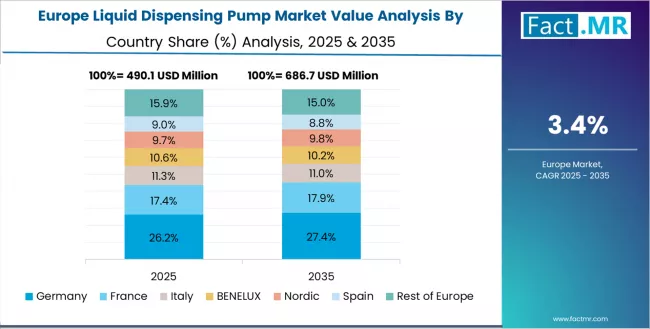
The European liquid dispensing pump market is projected to grow from USD 630.0 million in 2025 to USD 930.0 million by 2035, registering a CAGR of 4.0% over the forecast period. Germany is expected to maintain its leadership position with a 27.8% market share in 2025, declining slightly to 27.3% by 2035, supported by its advanced packaging infrastructure and major consumer goods centers in North Rhine-Westphalia and Bavaria.
France follows with a 20.4% share in 2025, projected to reach 20.8% by 2035, driven by comprehensive packaging modernization programs and specialty consumer goods initiatives. The United Kingdom holds a 18.6% share in 2025, expected to moderate to 18.1% by 2035 through specialized packaging activities and consumer goods applications. Italy commands a 13.9% share in 2025, rising to 14.3% by 2035 through strong packaging and consumer goods projects. Spain accounts for 10.1% in 2025, reaching 10.4% by 2035 aided by packaging modernization and dispensing applications. The Netherlands maintains a 4.4% share in 2025, increasing to 4.6% by 2035 driven by specialty packaging and innovation demand. The Rest of Europe region is anticipated to hold 4.8% in 2025, increasing to 4.5% by 2035, reflecting steady adoption in Nordic countries and Central & Eastern European packaging upgrades.
Personal Care Dominate Demand in Japan
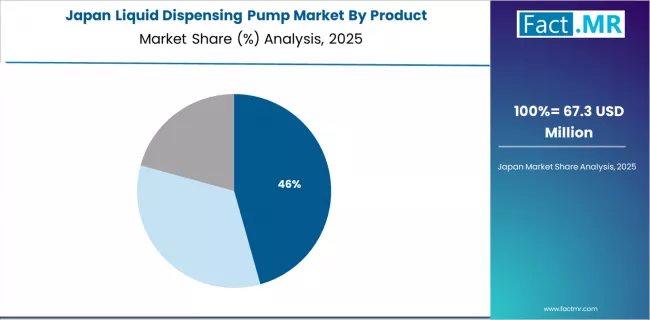
In Japan, the Liquid Dispensing Pump market prioritizes personal care systems, which capture the dominant share of packaging and specialty consumer goods installations due to their advanced features, including precision dispensing optimization and seamless integration with existing packaging infrastructure. Japanese manufacturers emphasize reliability, precision, and long-term operational excellence, creating demand for personal care systems that provide consistent liquid dispensing capabilities and adaptive performance based on dispensing requirements and packaging conditions.
Processing Companies Lead Packaging Services in South Korea
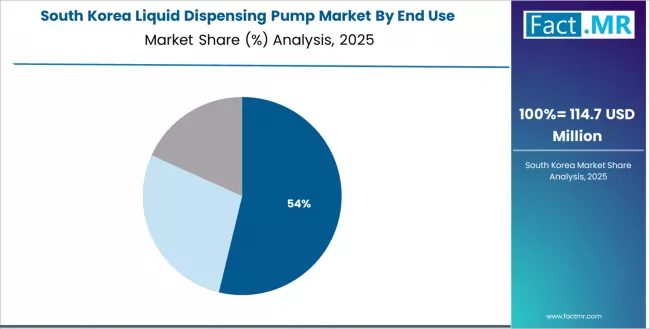
In South Korea, the market structure favors international processing companies, including Silgan Dispensing, AptarGroup, and Albea, which maintain dominant positions through comprehensive product portfolios and established packaging industry networks supporting both consumer goods manufacturing and personal care installations. These providers offer integrated solutions combining advanced liquid dispensing systems with professional application services and ongoing technical support that appeal to Korean manufacturers seeking reliable dispensing systems.
Competitive Landscape of the Liquid Dispensing Pump Market
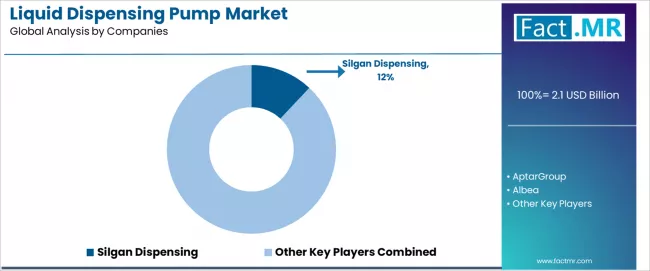
The liquid dispensing pump market operates with moderate concentration, featuring approximately 15-18 meaningful participants, where leading companies control roughly 34-41% of the global market share through established packaging industry relationships and comprehensive dispensing portfolios. Competition emphasizes advanced dispensing capabilities, system reliability, and packaging integration rather than price-based rivalry. The leading company, Silgan Dispensing, commands approximately 12.0% market share through its specialized dispensing expertise and extensive packaging and consumer goods industry presence.
Market Leaders encompass Silgan Dispensing, AptarGroup, and Albea, which maintain competitive advantages through extensive packaging expertise, global consumer goods networks, and comprehensive system integration capabilities that create customer switching costs and support premium pricing. These companies leverage years of dispensing technology experience and ongoing research investments to develop advanced liquid dispensing systems with precision delivery control and packaging monitoring features.
Technology Innovators include Berry Global, RPC Promens, and Rieke, which compete through specialized dispensing technology focus and innovative application interfaces that appeal to manufacturers seeking advanced delivery capabilities and operational flexibility. These companies differentiate through rapid development cycles and specialized packaging and consumer goods application focus. Regional Specialists feature companies like Mitani Valve, Guala Dispensing, Tapsa, and Yoshino Kogyosho, which focus on specific geographic markets and specialized applications. Market dynamics favor participants that combine reliable dispensing capabilities with advanced application systems, including precision delivery control and automatic performance optimization capabilities.
Key Players in the Liquid Dispensing Pump Market
- Silgan Dispensing
- AptarGroup
- Albea
- Berry Global
- RPC Promens
- Rieke
- Mitani Valve
- Guala Dispensing
- Tapsa
- Yoshino Kogyosho
Scope of the Report
| Item | Value |
|---|---|
| Quantitative Units | USD 2.1 Billion |
| Product | Lotion/soap pumps, Trigger/spray, Fine mist/others |
| End Use | Personal care, Household/chemical, Healthcare |
| Closure | 28/410, 24/410, Specialty/others |
| Regions Covered | North America, Europe, Asia Pacific, Latin America, Middle East & Africa |
| Countries Covered | United States, Germany, France, United Kingdom, Japan, South Korea, Mexico, and 15+ additional countries |
| Key Companies Profiled | Silgan Dispensing, AptarGroup, Albea, Berry Global, RPC Promens, Rieke, Mitani Valve |
| Additional Attributes | Dollar sales by product and end-use categories, regional adoption trends across North America, Europe, and Asia Pacific, competitive landscape with packaging processors and dispensing suppliers, manufacturer preferences for dispensing capabilities and system reliability, integration with packaging platforms and quality monitoring systems, innovations in lotion/soap pump processing and packaging compliance, and development of automated dispensing solutions with enhanced performance and packaging optimization capabilities. |
Liquid Dispensing Pump Market by Segments
-
Product :
- Lotion/soap pumps
- Trigger/spray
- Fine mist/others
-
End Use :
- Personal care
- Household/chemical
- Healthcare
-
Closure :
- 28/410
- 24/410
- Specialty/others
-
Region :
- North America
- United States
- Canada
- Mexico
- Europe
- Germany
- France
- United Kingdom
- Italy
- Spain
- Netherlands
- Nordic
- Rest of Europe
- Asia Pacific
- Japan
- South Korea
- China
- India
- ASEAN
- Australia & New Zealand
- Rest of Asia Pacific
- Latin America
- Brazil
- Argentina
- Rest of Latin America
- Middle East & Africa
- GCC Countries
- South Africa
- Rest of Middle East & Africa
- North America
Table of Content
- Executive Summary
- Global Market Outlook
- Demand to side Trends
- Supply to side Trends
- Technology Roadmap Analysis
- Analysis and Recommendations
- Market Overview
- Market Coverage / Taxonomy
- Market Definition / Scope / Limitations
- Market Background
- Market Dynamics
- Drivers
- Restraints
- Opportunity
- Trends
- Scenario Forecast
- Demand in Optimistic Scenario
- Demand in Likely Scenario
- Demand in Conservative Scenario
- Opportunity Map Analysis
- Product Life Cycle Analysis
- Supply Chain Analysis
- Investment Feasibility Matrix
- Value Chain Analysis
- PESTLE and Porter’s Analysis
- Regulatory Landscape
- Regional Parent Market Outlook
- Production and Consumption Statistics
- Import and Export Statistics
- Market Dynamics
- Global Market Analysis 2020 to 2024 and Forecast, 2025 to 2035
- Historical Market Size Value (USD Million) Analysis, 2020 to 2024
- Current and Future Market Size Value (USD Million) Projections, 2025 to 2035
- Y to o to Y Growth Trend Analysis
- Absolute $ Opportunity Analysis
- Global Market Pricing Analysis 2020 to 2024 and Forecast 2025 to 2035
- Global Market Analysis 2020 to 2024 and Forecast 2025 to 2035, By Product
- Introduction / Key Findings
- Historical Market Size Value (USD Million) Analysis By Product , 2020 to 2024
- Current and Future Market Size Value (USD Million) Analysis and Forecast By Product , 2025 to 2035
- Lotion/Soap Pumps
- Trigger/spray
- Fine mist/others
- Y to o to Y Growth Trend Analysis By Product , 2020 to 2024
- Absolute $ Opportunity Analysis By Product , 2025 to 2035
- Global Market Analysis 2020 to 2024 and Forecast 2025 to 2035, By End Use
- Introduction / Key Findings
- Historical Market Size Value (USD Million) Analysis By End Use, 2020 to 2024
- Current and Future Market Size Value (USD Million) Analysis and Forecast By End Use, 2025 to 2035
- Personal Care
- Household/chemical
- Healthcare
- Y to o to Y Growth Trend Analysis By End Use, 2020 to 2024
- Absolute $ Opportunity Analysis By End Use, 2025 to 2035
- Global Market Analysis 2020 to 2024 and Forecast 2025 to 2035, By Closure
- Introduction / Key Findings
- Historical Market Size Value (USD Million) Analysis By Closure, 2020 to 2024
- Current and Future Market Size Value (USD Million) Analysis and Forecast By Closure, 2025 to 2035
- 28/410
- 24/410
- Specialty/others
- Y to o to Y Growth Trend Analysis By Closure, 2020 to 2024
- Absolute $ Opportunity Analysis By Closure, 2025 to 2035
- Global Market Analysis 2020 to 2024 and Forecast 2025 to 2035, By Region
- Introduction
- Historical Market Size Value (USD Million) Analysis By Region, 2020 to 2024
- Current Market Size Value (USD Million) Analysis and Forecast By Region, 2025 to 2035
- North America
- Latin America
- Western Europe
- Eastern Europe
- East Asia
- South Asia and Pacific
- Middle East & Africa
- Market Attractiveness Analysis By Region
- North America Market Analysis 2020 to 2024 and Forecast 2025 to 2035, By Country
- Historical Market Size Value (USD Million) Trend Analysis By Market Taxonomy, 2020 to 2024
- Market Size Value (USD Million) Forecast By Market Taxonomy, 2025 to 2035
- By Country
- USA
- Canada
- Mexico
- By Product
- By End Use
- By Closure
- By Country
- Market Attractiveness Analysis
- By Country
- By Product
- By End Use
- By Closure
- Key Takeaways
- Latin America Market Analysis 2020 to 2024 and Forecast 2025 to 2035, By Country
- Historical Market Size Value (USD Million) Trend Analysis By Market Taxonomy, 2020 to 2024
- Market Size Value (USD Million) Forecast By Market Taxonomy, 2025 to 2035
- By Country
- Brazil
- Chile
- Rest of Latin America
- By Product
- By End Use
- By Closure
- By Country
- Market Attractiveness Analysis
- By Country
- By Product
- By End Use
- By Closure
- Key Takeaways
- Western Europe Market Analysis 2020 to 2024 and Forecast 2025 to 2035, By Country
- Historical Market Size Value (USD Million) Trend Analysis By Market Taxonomy, 2020 to 2024
- Market Size Value (USD Million) Forecast By Market Taxonomy, 2025 to 2035
- By Country
- Germany
- UK
- Italy
- Spain
- France
- Nordic
- BENELUX
- Rest of Western Europe
- By Product
- By End Use
- By Closure
- By Country
- Market Attractiveness Analysis
- By Country
- By Product
- By End Use
- By Closure
- Key Takeaways
- Eastern Europe Market Analysis 2020 to 2024 and Forecast 2025 to 2035, By Country
- Historical Market Size Value (USD Million) Trend Analysis By Market Taxonomy, 2020 to 2024
- Market Size Value (USD Million) Forecast By Market Taxonomy, 2025 to 2035
- By Country
- Russia
- Poland
- Hungary
- Balkan & Baltic
- Rest of Eastern Europe
- By Product
- By End Use
- By Closure
- By Country
- Market Attractiveness Analysis
- By Country
- By Product
- By End Use
- By Closure
- Key Takeaways
- East Asia Market Analysis 2020 to 2024 and Forecast 2025 to 2035, By Country
- Historical Market Size Value (USD Million) Trend Analysis By Market Taxonomy, 2020 to 2024
- Market Size Value (USD Million) Forecast By Market Taxonomy, 2025 to 2035
- By Country
- China
- Japan
- South Korea
- By Product
- By End Use
- By Closure
- By Country
- Market Attractiveness Analysis
- By Country
- By Product
- By End Use
- By Closure
- Key Takeaways
- South Asia and Pacific Market Analysis 2020 to 2024 and Forecast 2025 to 2035, By Country
- Historical Market Size Value (USD Million) Trend Analysis By Market Taxonomy, 2020 to 2024
- Market Size Value (USD Million) Forecast By Market Taxonomy, 2025 to 2035
- By Country
- India
- ASEAN
- Australia & New Zealand
- Rest of South Asia and Pacific
- By Product
- By End Use
- By Closure
- By Country
- Market Attractiveness Analysis
- By Country
- By Product
- By End Use
- By Closure
- Key Takeaways
- Middle East & Africa Market Analysis 2020 to 2024 and Forecast 2025 to 2035, By Country
- Historical Market Size Value (USD Million) Trend Analysis By Market Taxonomy, 2020 to 2024
- Market Size Value (USD Million) Forecast By Market Taxonomy, 2025 to 2035
- By Country
- Kingdom of Saudi Arabia
- Other GCC Countries
- Turkiye
- South Africa
- Other African Union
- Rest of Middle East & Africa
- By Product
- By End Use
- By Closure
- By Country
- Market Attractiveness Analysis
- By Country
- By Product
- By End Use
- By Closure
- Key Takeaways
- Key Countries Market Analysis
- USA
- Pricing Analysis
- Market Share Analysis, 2024
- By Product
- By End Use
- By Closure
- Canada
- Pricing Analysis
- Market Share Analysis, 2024
- By Product
- By End Use
- By Closure
- Mexico
- Pricing Analysis
- Market Share Analysis, 2024
- By Product
- By End Use
- By Closure
- Brazil
- Pricing Analysis
- Market Share Analysis, 2024
- By Product
- By End Use
- By Closure
- Chile
- Pricing Analysis
- Market Share Analysis, 2024
- By Product
- By End Use
- By Closure
- Germany
- Pricing Analysis
- Market Share Analysis, 2024
- By Product
- By End Use
- By Closure
- UK
- Pricing Analysis
- Market Share Analysis, 2024
- By Product
- By End Use
- By Closure
- Italy
- Pricing Analysis
- Market Share Analysis, 2024
- By Product
- By End Use
- By Closure
- Spain
- Pricing Analysis
- Market Share Analysis, 2024
- By Product
- By End Use
- By Closure
- France
- Pricing Analysis
- Market Share Analysis, 2024
- By Product
- By End Use
- By Closure
- India
- Pricing Analysis
- Market Share Analysis, 2024
- By Product
- By End Use
- By Closure
- ASEAN
- Pricing Analysis
- Market Share Analysis, 2024
- By Product
- By End Use
- By Closure
- Australia & New Zealand
- Pricing Analysis
- Market Share Analysis, 2024
- By Product
- By End Use
- By Closure
- China
- Pricing Analysis
- Market Share Analysis, 2024
- By Product
- By End Use
- By Closure
- Japan
- Pricing Analysis
- Market Share Analysis, 2024
- By Product
- By End Use
- By Closure
- South Korea
- Pricing Analysis
- Market Share Analysis, 2024
- By Product
- By End Use
- By Closure
- Russia
- Pricing Analysis
- Market Share Analysis, 2024
- By Product
- By End Use
- By Closure
- Poland
- Pricing Analysis
- Market Share Analysis, 2024
- By Product
- By End Use
- By Closure
- Hungary
- Pricing Analysis
- Market Share Analysis, 2024
- By Product
- By End Use
- By Closure
- Kingdom of Saudi Arabia
- Pricing Analysis
- Market Share Analysis, 2024
- By Product
- By End Use
- By Closure
- Turkiye
- Pricing Analysis
- Market Share Analysis, 2024
- By Product
- By End Use
- By Closure
- South Africa
- Pricing Analysis
- Market Share Analysis, 2024
- By Product
- By End Use
- By Closure
- USA
- Market Structure Analysis
- Competition Dashboard
- Competition Benchmarking
- Market Share Analysis of Top Players
- By Regional
- By Product
- By End Use
- By Closure
- Competition Analysis
- Competition Deep Dive
- Silgan Dispensing
- Overview
- Product Portfolio
- Profitability by Market Segments (Product/Age /Sales Channel/Region)
- Sales Footprint
- Strategy Overview
- Marketing Strategy
- Product Strategy
- Channel Strategy
- AptarGroup
- Albea
- Berry Global
- RPC Promens
- Rieke
- Mitani Valve
- Guala Dispensing
- Tapsa
- Yoshino Kogyosho
- Silgan Dispensing
- Competition Deep Dive
- Assumptions & Acronyms Used
- Research Methodology
List Of Table
- Table 1: Global Market Value (USD Million) Forecast by Region, 2020 to 2035
- Table 2: Global Market Value (USD Million) Forecast by Product , 2020 to 2035
- Table 3: Global Market Value (USD Million) Forecast by End Use, 2020 to 2035
- Table 4: Global Market Value (USD Million) Forecast by Closure, 2020 to 2035
- Table 5: North America Market Value (USD Million) Forecast by Country, 2020 to 2035
- Table 6: North America Market Value (USD Million) Forecast by Product , 2020 to 2035
- Table 7: North America Market Value (USD Million) Forecast by End Use, 2020 to 2035
- Table 8: North America Market Value (USD Million) Forecast by Closure, 2020 to 2035
- Table 9: Latin America Market Value (USD Million) Forecast by Country, 2020 to 2035
- Table 10: Latin America Market Value (USD Million) Forecast by Product , 2020 to 2035
- Table 11: Latin America Market Value (USD Million) Forecast by End Use, 2020 to 2035
- Table 12: Latin America Market Value (USD Million) Forecast by Closure, 2020 to 2035
- Table 13: Western Europe Market Value (USD Million) Forecast by Country, 2020 to 2035
- Table 14: Western Europe Market Value (USD Million) Forecast by Product , 2020 to 2035
- Table 15: Western Europe Market Value (USD Million) Forecast by End Use, 2020 to 2035
- Table 16: Western Europe Market Value (USD Million) Forecast by Closure, 2020 to 2035
- Table 17: Eastern Europe Market Value (USD Million) Forecast by Country, 2020 to 2035
- Table 18: Eastern Europe Market Value (USD Million) Forecast by Product , 2020 to 2035
- Table 19: Eastern Europe Market Value (USD Million) Forecast by End Use, 2020 to 2035
- Table 20: Eastern Europe Market Value (USD Million) Forecast by Closure, 2020 to 2035
- Table 21: East Asia Market Value (USD Million) Forecast by Country, 2020 to 2035
- Table 22: East Asia Market Value (USD Million) Forecast by Product , 2020 to 2035
- Table 23: East Asia Market Value (USD Million) Forecast by End Use, 2020 to 2035
- Table 24: East Asia Market Value (USD Million) Forecast by Closure, 2020 to 2035
- Table 25: South Asia and Pacific Market Value (USD Million) Forecast by Country, 2020 to 2035
- Table 26: South Asia and Pacific Market Value (USD Million) Forecast by Product , 2020 to 2035
- Table 27: South Asia and Pacific Market Value (USD Million) Forecast by End Use, 2020 to 2035
- Table 28: South Asia and Pacific Market Value (USD Million) Forecast by Closure, 2020 to 2035
- Table 29: Middle East & Africa Market Value (USD Million) Forecast by Country, 2020 to 2035
- Table 30: Middle East & Africa Market Value (USD Million) Forecast by Product , 2020 to 2035
- Table 31: Middle East & Africa Market Value (USD Million) Forecast by End Use, 2020 to 2035
- Table 32: Middle East & Africa Market Value (USD Million) Forecast by Closure, 2020 to 2035
List Of Figures
- Figure 1: Global Market Pricing Analysis
- Figure 2: Global Market Value (USD Million) Forecast 2020-2035
- Figure 3: Global Market Value Share and BPS Analysis by Product , 2025 and 2035
- Figure 4: Global Market Y to o to Y Growth Comparison by Product , 2025-2035
- Figure 5: Global Market Attractiveness Analysis by Product
- Figure 6: Global Market Value Share and BPS Analysis by End Use, 2025 and 2035
- Figure 7: Global Market Y to o to Y Growth Comparison by End Use, 2025-2035
- Figure 8: Global Market Attractiveness Analysis by End Use
- Figure 9: Global Market Value Share and BPS Analysis by Closure, 2025 and 2035
- Figure 10: Global Market Y to o to Y Growth Comparison by Closure, 2025-2035
- Figure 11: Global Market Attractiveness Analysis by Closure
- Figure 12: Global Market Value (USD Million) Share and BPS Analysis by Region, 2025 and 2035
- Figure 13: Global Market Y to o to Y Growth Comparison by Region, 2025-2035
- Figure 14: Global Market Attractiveness Analysis by Region
- Figure 15: North America Market Incremental Dollar Opportunity, 2025-2035
- Figure 16: Latin America Market Incremental Dollar Opportunity, 2025-2035
- Figure 17: Western Europe Market Incremental Dollar Opportunity, 2025-2035
- Figure 18: Eastern Europe Market Incremental Dollar Opportunity, 2025-2035
- Figure 19: East Asia Market Incremental Dollar Opportunity, 2025-2035
- Figure 20: South Asia and Pacific Market Incremental Dollar Opportunity, 2025-2035
- Figure 21: Middle East & Africa Market Incremental Dollar Opportunity, 2025-2035
- Figure 22: North America Market Value Share and BPS Analysis by Country, 2025 and 2035
- Figure 23: North America Market Value Share and BPS Analysis by Product , 2025 and 2035
- Figure 24: North America Market Y to o to Y Growth Comparison by Product , 2025-2035
- Figure 25: North America Market Attractiveness Analysis by Product
- Figure 26: North America Market Value Share and BPS Analysis by End Use, 2025 and 2035
- Figure 27: North America Market Y to o to Y Growth Comparison by End Use, 2025-2035
- Figure 28: North America Market Attractiveness Analysis by End Use
- Figure 29: North America Market Value Share and BPS Analysis by Closure, 2025 and 2035
- Figure 30: North America Market Y to o to Y Growth Comparison by Closure, 2025-2035
- Figure 31: North America Market Attractiveness Analysis by Closure
- Figure 32: Latin America Market Value Share and BPS Analysis by Country, 2025 and 2035
- Figure 33: Latin America Market Value Share and BPS Analysis by Product , 2025 and 2035
- Figure 34: Latin America Market Y to o to Y Growth Comparison by Product , 2025-2035
- Figure 35: Latin America Market Attractiveness Analysis by Product
- Figure 36: Latin America Market Value Share and BPS Analysis by End Use, 2025 and 2035
- Figure 37: Latin America Market Y to o to Y Growth Comparison by End Use, 2025-2035
- Figure 38: Latin America Market Attractiveness Analysis by End Use
- Figure 39: Latin America Market Value Share and BPS Analysis by Closure, 2025 and 2035
- Figure 40: Latin America Market Y to o to Y Growth Comparison by Closure, 2025-2035
- Figure 41: Latin America Market Attractiveness Analysis by Closure
- Figure 42: Western Europe Market Value Share and BPS Analysis by Country, 2025 and 2035
- Figure 43: Western Europe Market Value Share and BPS Analysis by Product , 2025 and 2035
- Figure 44: Western Europe Market Y to o to Y Growth Comparison by Product , 2025-2035
- Figure 45: Western Europe Market Attractiveness Analysis by Product
- Figure 46: Western Europe Market Value Share and BPS Analysis by End Use, 2025 and 2035
- Figure 47: Western Europe Market Y to o to Y Growth Comparison by End Use, 2025-2035
- Figure 48: Western Europe Market Attractiveness Analysis by End Use
- Figure 49: Western Europe Market Value Share and BPS Analysis by Closure, 2025 and 2035
- Figure 50: Western Europe Market Y to o to Y Growth Comparison by Closure, 2025-2035
- Figure 51: Western Europe Market Attractiveness Analysis by Closure
- Figure 52: Eastern Europe Market Value Share and BPS Analysis by Country, 2025 and 2035
- Figure 53: Eastern Europe Market Value Share and BPS Analysis by Product , 2025 and 2035
- Figure 54: Eastern Europe Market Y to o to Y Growth Comparison by Product , 2025-2035
- Figure 55: Eastern Europe Market Attractiveness Analysis by Product
- Figure 56: Eastern Europe Market Value Share and BPS Analysis by End Use, 2025 and 2035
- Figure 57: Eastern Europe Market Y to o to Y Growth Comparison by End Use, 2025-2035
- Figure 58: Eastern Europe Market Attractiveness Analysis by End Use
- Figure 59: Eastern Europe Market Value Share and BPS Analysis by Closure, 2025 and 2035
- Figure 60: Eastern Europe Market Y to o to Y Growth Comparison by Closure, 2025-2035
- Figure 61: Eastern Europe Market Attractiveness Analysis by Closure
- Figure 62: East Asia Market Value Share and BPS Analysis by Country, 2025 and 2035
- Figure 63: East Asia Market Value Share and BPS Analysis by Product , 2025 and 2035
- Figure 64: East Asia Market Y to o to Y Growth Comparison by Product , 2025-2035
- Figure 65: East Asia Market Attractiveness Analysis by Product
- Figure 66: East Asia Market Value Share and BPS Analysis by End Use, 2025 and 2035
- Figure 67: East Asia Market Y to o to Y Growth Comparison by End Use, 2025-2035
- Figure 68: East Asia Market Attractiveness Analysis by End Use
- Figure 69: East Asia Market Value Share and BPS Analysis by Closure, 2025 and 2035
- Figure 70: East Asia Market Y to o to Y Growth Comparison by Closure, 2025-2035
- Figure 71: East Asia Market Attractiveness Analysis by Closure
- Figure 72: South Asia and Pacific Market Value Share and BPS Analysis by Country, 2025 and 2035
- Figure 73: South Asia and Pacific Market Value Share and BPS Analysis by Product , 2025 and 2035
- Figure 74: South Asia and Pacific Market Y to o to Y Growth Comparison by Product , 2025-2035
- Figure 75: South Asia and Pacific Market Attractiveness Analysis by Product
- Figure 76: South Asia and Pacific Market Value Share and BPS Analysis by End Use, 2025 and 2035
- Figure 77: South Asia and Pacific Market Y to o to Y Growth Comparison by End Use, 2025-2035
- Figure 78: South Asia and Pacific Market Attractiveness Analysis by End Use
- Figure 79: South Asia and Pacific Market Value Share and BPS Analysis by Closure, 2025 and 2035
- Figure 80: South Asia and Pacific Market Y to o to Y Growth Comparison by Closure, 2025-2035
- Figure 81: South Asia and Pacific Market Attractiveness Analysis by Closure
- Figure 82: Middle East & Africa Market Value Share and BPS Analysis by Country, 2025 and 2035
- Figure 83: Middle East & Africa Market Value Share and BPS Analysis by Product , 2025 and 2035
- Figure 84: Middle East & Africa Market Y to o to Y Growth Comparison by Product , 2025-2035
- Figure 85: Middle East & Africa Market Attractiveness Analysis by Product
- Figure 86: Middle East & Africa Market Value Share and BPS Analysis by End Use, 2025 and 2035
- Figure 87: Middle East & Africa Market Y to o to Y Growth Comparison by End Use, 2025-2035
- Figure 88: Middle East & Africa Market Attractiveness Analysis by End Use
- Figure 89: Middle East & Africa Market Value Share and BPS Analysis by Closure, 2025 and 2035
- Figure 90: Middle East & Africa Market Y to o to Y Growth Comparison by Closure, 2025-2035
- Figure 91: Middle East & Africa Market Attractiveness Analysis by Closure
- Figure 92: Global Market - Tier Structure Analysis
- Figure 93: Global Market - Company Share Analysis
- FAQs -
How big is the liquid dispensing pump market in 2025?
The global liquid dispensing pump market is estimated to be valued at USD 2.1 billion in 2025.
What will be the size of liquid dispensing pump market in 2035?
The market size for the liquid dispensing pump market is projected to reach USD 3.1 billion by 2035.
How much will be the liquid dispensing pump market growth between 2025 and 2035?
The liquid dispensing pump market is expected to grow at a 4.0% CAGR between 2025 and 2035.
What are the key product types in the liquid dispensing pump market?
The key product types in liquid dispensing pump market are lotion/soap pumps , trigger/spray and fine mist/others.
Which end use segment to contribute significant share in the liquid dispensing pump market in 2025?
In terms of end use, personal care segment to command 52.0% share in the liquid dispensing pump market in 2025.